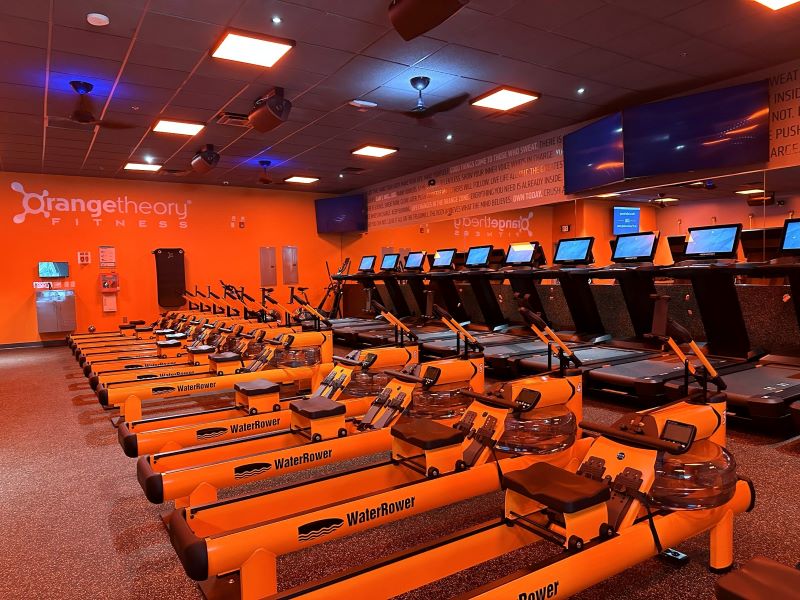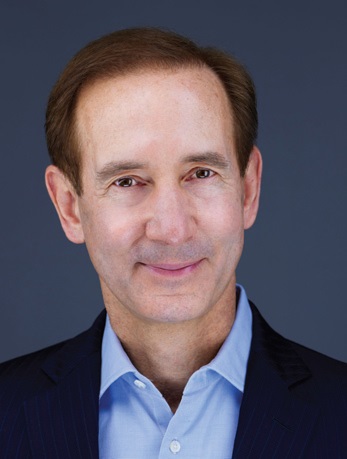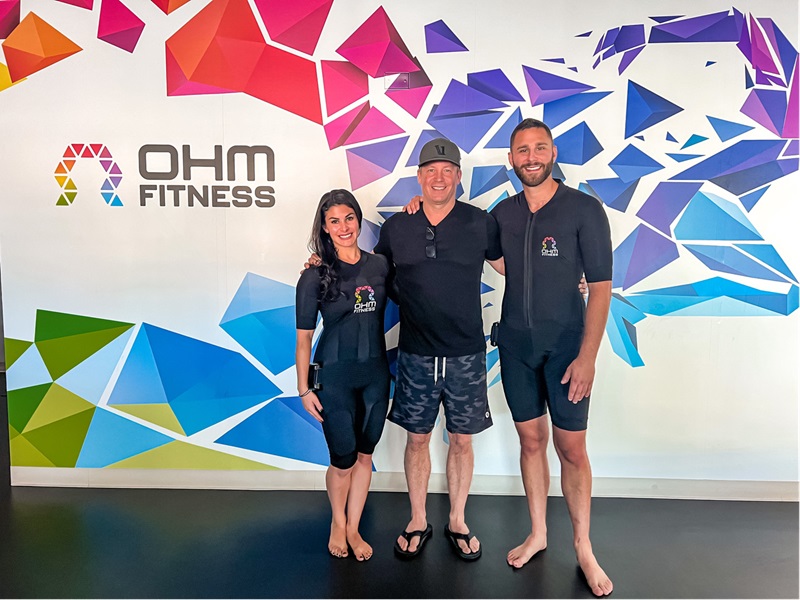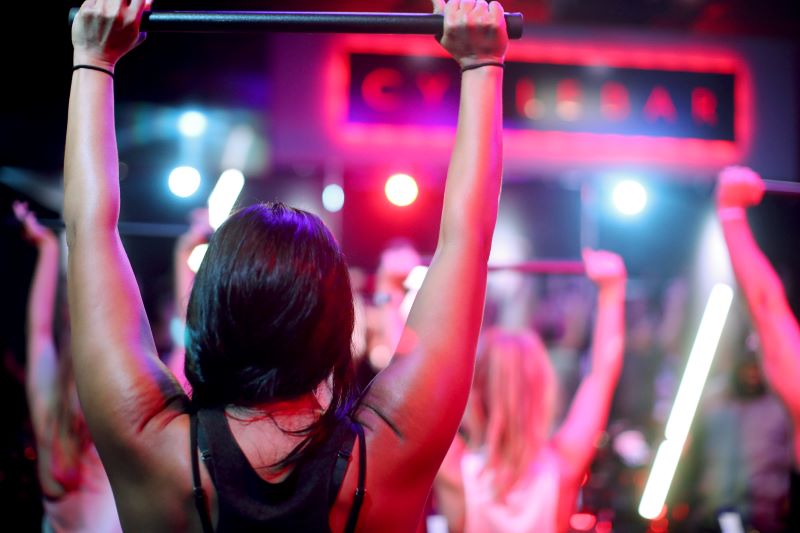Boutique fitness brands such as CycleBar are providing a new source of foot traffic and leasing activity for retail properties in New Jersey. — Courtesy: CycleBar
By Marlaina Cockcroft
When it comes to fitness tenants, think smaller. That’s the mindset at shopping centers and downtown locations throughout New Jersey, as specialty fitness studios are increasingly finding favor with owners and customers.
Real estate and fitness industry insiders say the studios, which offer group classes in one style of workout, appeal to customers and fit in a variety of retail layouts, helping draw traffic to surrounding stores. For instance, the remodeled Shoppes at the Livingston Circle, at 277 Eisenhower Parkway, features Rumble Boxing, CycleBar, Club Pilates and YogaSix, all concepts owned by global franchise group Xponential Fitness.

Pete Schofel, managing partner of Eastman Cos., said the firm brought the tenants to the property because “we saw a niche need that fit very well within the demographics of Livingston.” Once CycleBar opened, the landlord realized customers also wanted yoga, Pilates and other studio options. Xponential suggested the multiple studio concept.
Schofel said some customers exercise before or after work, while stay-at-home parents take classes during the day.
“People want flexibility, they want a good workout and a good class,” he said. “Every one of them has been very well received.”
The fitness studios turned The Shoppes at the Livingston Circle into “a really family-oriented center,” said Florian Suserman, an executive vice president with RIPCO Real Estate, who represents both Xponential Fitness and ownership at the Eastman property.

“To have four in one center and thrive, it means something, because the price points are very different on these specialty fitness brands than going to a regular gym,” he said.
Previously known as the Village at Livingston, the center is anchored by Aldi and also features Hand & Stone Massage and Facial Spa, hair salons for children and adults, Mezza Mediterranean, a swim school and the Twisted Tulip coffee shop, among other tenants.
Specialty fitness studios take up less space than traditional gyms, generally around 1,800 to 3,000 square feet.
“They’re run very efficiently,” Suserman said, noting that the studios are busiest between 6 and 10 a.m., when the rest of the shopping center isn’t, and again from 5 to 9 p.m. “They all share parking and they all kind of fit in the mold together, and the co-tenancy just clicks.”

Other specialty fitness brands are seeing growth as well. Matthew Harding, CEO of Levin Management Corp., said the firm’s client properties are home to operators such as OrangeTheory Fitness and Pure Barre. Route 9 Plaza in Old Bridge, which LMC manages, features a SETS Hybrid Training gym, while the firm has signed leases with a yoga studio that’s under construction and a local circuit training studio.
“They seem to be holding their own and doing well,” Harding said. “They’re good additions for retail properties.”
He thinks the trend is an evolution of the fitness industry over the past 15 to 20 years, from large gyms to moderate-sized gyms like Planet Fitness and Crunch that offer spin and other classes.

“That’s migrated out to these more specialized workouts, where people can go in, they know what they’re going to do and are there a few times a week,” he said.
A smaller studio doesn’t have a huge impact on a parking lot, “and it brings people back to the property on a relatively frequent basis,” Harding added.
Suserman called the COVID-19 pandemic a factor as well.
“Once COVID hit, (with) the lack of cleanliness, the amount of people going to the gym, people got afraid.”
A Pilates class may only have 12 people in a room, which is disinfected before and after class. In addition, he said, while traditional health clubs charge from $20 to $60 a month and need thousands of members, smaller studios need 300 to 500 members and can charge $150 to $200 a month for unlimited memberships.
Harding sees growth in larger gyms as well, though. Levin Management recently finished a Planet Fitness lease and is working on another gym deal in the 12,000- to 15,000-square-foot-range. He said some people may have memberships in both types of facilities, since they offer different workout options.
Suserman said Xponential, which also owns Stretch Lab, Row House, BFT and other brands, is growing by 200 to 300 locations a year. There have been reports of Xponential locations shutting down in other states, with franchisees claiming they got little support from the company, but Suserman said, “When you’re 3,000 studios, you’re going to have a percentage of franchisees that either don’t follow the model, don’t spend the money that they’re supposed to do, don’t hire a (general manager).”
He didn’t know why specific locations might have shut down, adding: “I would assume that as they’re growing so big, that they’re seeing some franchisees that aren’t performing.”
In the meantime, new Club Pilates locations are coming in West Orange, Bayonne and Bridgewater, as well as Rumble Boxing in Montclair and Short Hills. Rumble locations are now open in Hoboken and Edgewater.

And new specialty fitness brands are on the way. OHM Fitness, which relies on electrical muscle stimulation suits in its workout classes, is opening its first two New Jersey locations this year — in Park Ridge in about a month and Wayne in the late spring. A Princeton location is expected in 2025.
Jake and Alyssa Kapneck, who handle OHM’s development for New Jersey, Maryland and Washington, D.C., say the suits enable a lower-intensity workout with less wear and tear on the joints. They invested in the company because “it is a workout for everybody,” Jake Kapneck said, and they’re planning to open 30 New Jersey locations over the next few years.
Harding expects such growth to continue. Specialty fitness is “a concept that’s here to stay,” he said.
Marlaina Cockcroft is a freelance writer based in New Jersey. Other publications she writes for include New Jersey Monthly and School Library Journal.









